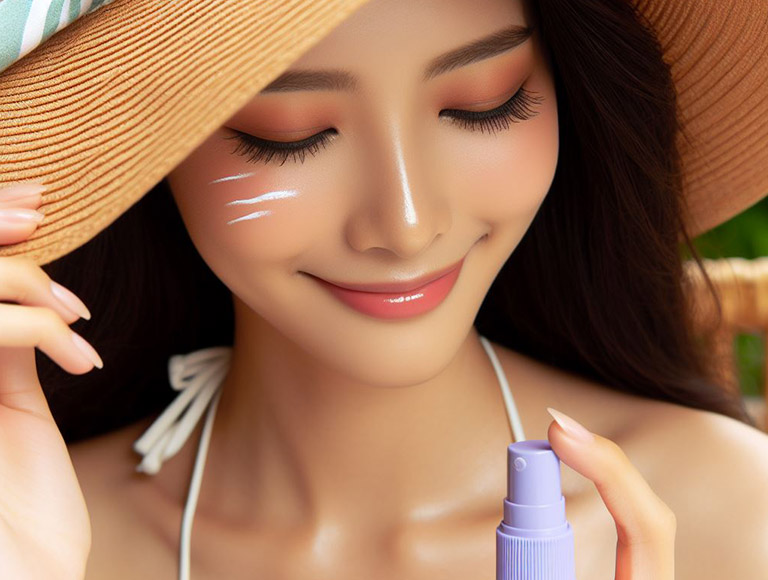|
Getting your Trinity Audio player ready...
|

Protecting the skin against sun exposure is increasingly recognized as an important public health problem, as knowledge about the risks of ultraviolet (UV) radiation increases. It is well documented that UV radiation causes skin cancer, sunburn, premature aging, immunosuppression and activation of latent viruses. Although climatic factors can influence the level of UV radiation at the Earth's surface, it is individual behavior that has the greatest impact on exposure to UV radiation.
A study published in January 2024, funded by La Roche Posay International and conducted by universities located in Japan, Singapore, Korea, Senegal, China, Spain, France, Germany, Mexico and the United States evaluated the population's attitudes and behaviors in relation to sun exposure in Japan and compared it with the behavioral attitudes of the population in Europe and Central and North America. The results of this study reveal interesting data regarding beliefs about healthy tanning among men and women.
Sun protection habits and the perception of skin risks present in the Japanese population differ according to age, sex and phototype. Compared to Europeans and North Americans, the Japanese remain more cautious about sun-induced dangers and still consider lighter skin to be more attractive.
The study population was a representative sample of individuals aged >18 years drawn from Ipsos panels in Japan (N= 1,000), North America (N= 1,000), and Europe (N= 6,000) using the quota method. The questionnaires addressed habits, practices and perceptions regarding sun exposure. The results revealed that most people (80.1%) believe that the sun gives them energy and 61.1% consider that tanning makes them healthier. However, there was a significant difference between men and women regarding the appeal of tanned skin, with 54.95% of men versus 34.67% (p< 0.001) of women seeing tan as an aesthetic asset. People aged <40 years were less likely to find a tan attractive (30.3%) compared to those aged ≥40 years (48.9%) (p< 0.001). Of those questioned, 45.70% used sunscreen, with much greater use among women (70.10%) than among men (18.74%) (p< 0.001). Almost 54% of people stated that they stay in the shade to protect themselves from the sun, with this behavior being more prevalent among women (67.05%) and light-skinned individuals (56.13%). Fear of the risks of sun exposure was more common among women, with 84.8% fearing premature skin aging, compared to 71.8% of men (p< 0.001). In Japan, 44.30% of respondents stated that tanned skin was attractive (p< 0.001); for Europeans and North Americans the proportions were 81.1% and 77.6%, respectively. Only a quarter (25,80%) found it essential to return from vacation with a tan. On the other hand, Europeans have demonstrated a strong recognition of the energy the sun brings (83.18%) and widely believe that tanned skin is attractive (82.32%) and healthy (73.15%). In North America, attitudes were similar to those in Europe regarding the attractiveness of tanned skin (77.65%) and the importance of returning from vacation tanned (48.15%). Compared to Europeans and North Americans, the Japanese appeared to be more cautious about sun-induced dangers and found lighter skin to be more attractive.
Given that sun exposure is an important factor in skin cancer and photoaging, promoting new cultural beliefs like those in Japan and changing the definition of physical attractiveness could be a strategy to encourage sun-smart behavior in campaigns against sun exposure. The culture and perception of tanned skin among the Japanese population appears to be a protective factor against sun exposure. With the increasing use of social media, promoting the beauty perception of fair skin on different online platforms could be considered to build a new beauty trend alongside other trends.
Reference:
MORITA A.; LIM HW; PASSERON T.; GOHCL; KANG HY; LY F.; OCAMPO-CANDIANI J.; PUIG S.; SCHALKA S.; WEI L.; DEMESSANT AL; FLOC'H C. Le; KEROB D.; DRAIN B.; KRUTMANN J. (2024). Attitudes and behaviors regarding sun exposure in Japan compared to Europe and North America. The Journal of Dermatology; 00: 1-6. doi:10.1111/1346-8138.17217.
Want to know more about Security Assessment?
- Visit our website: https://sfsafetyconsulting.com.br
- Follow our social media pages on Facebook and Instagram.
Safety in cosmetics. Because you need to have it.
SF Safety Consulting.
Passion for knowledge and science.
